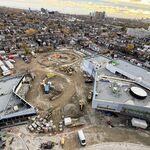You are using an out of date browser. It may not display this or other websites correctly.
You should upgrade or use an alternative browser.
You should upgrade or use an alternative browser.
nfitz
Superstar
Seems comparable; the media said 900 during the strike in 2014, and we know they've been adding shifts recently, so presumably over 1,000 - for 3 product lines currently (GO cab cars, Toronto Rockets, and Flexity streetcars). I'm not sure all of what Derby is making, but for London alone, they are making the S Stock (almost 1,400 cars), Crossrail cars (almost 600) and Class 710 London Overground cars (180 cars), along with other odds and ends, such as Gatwick Express cars, and some cars for the Great Western Railway, and 80 or so for the rollingstock leasing company Porterbrook. I have no idea what else they might be doing as well.Wiki reckons Derby Carriage and Wagon Works employs ~1600 people. I wonder how many BBD TB employs?
pstogios
Senior Member
I think it's safe to say any promises by Bombardier regarding streetcar production are worth about as much as the toilet paper I just used to wipe my a**.
nfitz
Superstar
I don't know - I get the expensive stuff at home; less bleeding.I think it's safe to say any promises by Bombardier regarding streetcar production are worth about as much as the toilet paper I just used to wipe my a**.
kotsy
Senior Member
How was start-up though? Recall that the 2009 Stock start-up was so poor, that TFL was in a war with Bombardier, and there's even a documentary made about it.
What was the name of that documentary? I'd love to watch it.
nfitz
Superstar
Episode 4 of BBC's 2012 series of The Tube. https://en.wikipedia.org/wiki/The_Tube_(2012_TV_series)
crs1026
Superstar
To meet the added production, Bombardier will need more transporter cars. I hope they don't have to be fabricated in Bombardier's Mexico plant. We know how well that works ;-)
- Paul
- Paul
Kitsune
Senior Member
Why don't the Flexity have ad's on the inside yet?
rbt
Senior Member
How was the TR delivery start-up? I never hear people complaining about TR deliveries (which come from the same factory) so I am assuming all is good there.
IIRC, they bought the company that makes teh doors because it went bankrupt and held up deliveries by around 8 months. TTC isn't particularly thrilled that they had to make modifications after accepting them either (hand-holds under air units, external speakers, etc.).
nfitz
Superstar
That seems more like a TTC design/spec issue than a Bombardier issue.TTC isn't particularly thrilled that they had to make modifications after accepting them either (hand-holds under air units, external speakers, etc.).
coopEng
Active Member
Maybe for the handholds, but the T1s came with speakers on the outside of the doors - seems logical to have kept a design element like thatThat seems more like a TTC design/spec issue than a Bombardier issue.
crs1026
Superstar
The time between the delivery of the prototype TR and the production models was a lot shorter and the first few production sets arrived much more regularly. From that perspective the delivery was successful. The model worked well on delivery, but there were some 'lessons learned' as the first few sets broke in that resulted in change orders and retrofits.
The big issue with the doors was that they closed very cautiously - to the point that it took forever before the trains could move off. After experience with the first few sets in service, TTC found that this was actually causing delays and headways weren't being maintained. It took some sharp publicly reported complaints by Byford to get this addressed.
One doesn't hear about any lasting deficiencies with the fleet.
This from 2012 http://www.thestar.com/news/city_ha...subway_doors_to_be_fixed_bombardier_says.html
- Paul
The big issue with the doors was that they closed very cautiously - to the point that it took forever before the trains could move off. After experience with the first few sets in service, TTC found that this was actually causing delays and headways weren't being maintained. It took some sharp publicly reported complaints by Byford to get this addressed.
One doesn't hear about any lasting deficiencies with the fleet.
This from 2012 http://www.thestar.com/news/city_ha...subway_doors_to_be_fixed_bombardier_says.html
- Paul
Last edited:
nfitz
Superstar
Still not seeing how that's a Bombardier issue, if TTC didnt' spec it.Maybe for the handholds, but the T1s came with speakers on the outside of the doors - seems logical to have kept a design element like that
ottbike
Active Member
Why don't the Flexity have ad's on the inside yet?
Because the TTC would like to remind you that Toronto's new streetcars are jointly funded by the City of Toronto, Government of Ontario and the Government of Canada
nfitz
Superstar
Perhaps there's something in a funding contract with one of the governments, that utilizes all the advertising space.
Is the advertising space the same dimension of any existing vehicles? If it's different, they might not have enough vehicles yet, to be worth anyone's while.
Is the advertising space the same dimension of any existing vehicles? If it's different, they might not have enough vehicles yet, to be worth anyone's while.





